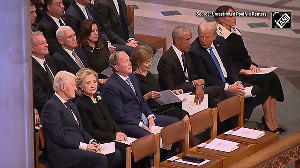Videsh Sanchar Nigam Ltd is investing $600 million to lay submarine cables, one between India and Europe and another intra-Asia.
The Tata group, which has management control of VSNL, will rope in partners to lay the multi-terabit cables.
The cables dovetail into VSNL's plans to build a global submarine cable system connecting India.
At the moment, VSNL has limited bandwidth only 40 gigabits on the busy India-Europe leg in the SEA-ME-WE consortium cable, where it is one of 14 partners. It also buys bandwidth on the Singapore- Hong Kong-Japan leg before it is connected to the US west coast.
"The new cables will enhance VSNL's global network in two of the fastest growing regions of the world. We will be investing around $250 million in the Asian cable, and $350 million in the European one. These are expected to be 'lit' by 2007-end and by the first-or second-quarter of 2008, respectively," VSNL Executive Director N Srinath told reporters here today.
Once these are completed, VSNL will have a 200,000-km undersea cable system criss-crossing the globe.
The new cables will be incorporated into the company's existing network that includes the SEA-ME-WE series, the Tyco system (which it bought over), Teleglobe, and the Tata-Indicom (Chennai-Singapore) system. VSNL has over 20 terabits of capacity.
VSNL executives pointed out that they anticipated a demand of over 10 terabits from India to the US via Europe in the next four to five years, from the booming BPO and ITES industry. The India-Europe cable will also provide connectivity to the Persian Gulf and Africa.
They further pointed out that VSNL was being forced to buy leased capacity between Singapore and Japan. Once this loop was completed, it would connect the west coast of the US via Singapore, Hong Kong and Japan. Tyco owns the submarine cable that connects Japan with the US.
VSNL will shortly mandate vendors for laying these cables. The network operating centres for the two systems will be in Mumbai. The Asian cable will have a landing station in Chennai, and the European one in Mumbai.
The Tata group company is looking at laying these cables in partnership, and is in talks with almost all the carriers in these regions.
VSNL's main competitor in providing international bandwidth, Reliance Communications (through Flag Telecom), has announced its intention to lay a cable, known as Falcon, between India and Egypt to enhance its capacity on the European route.
However, its attempts to enhance capacity on Flag Telecom, which it bought over, are stuck due to a dispute with VSNL.






 © 2025
© 2025